LightBits Labs: Harness Power of NVMe/TCP to Get Highly Available Storage for Virtualized Applications
Single LightOS cluster can deliver over 40 millon IO/s (random read) and 10PB capacity with 200μs latency.
This is a Press Release edited by StorageNewsletter.com on October 4, 2021 at 2:03 pm By Kam Eshghi, chief strategy officer, Lightbits Labs, Inc.
By Kam Eshghi, chief strategy officer, Lightbits Labs, Inc.
Authors:
Tom Nagelmeyer, group product marketing manager, VMware, Inc.
Vivek Sarathy, director, product management, Intel Corp.
Kam Eshghi, chief strategy officer, Lightbits Labs, Inc.
The data center is evolving in response to modern cloud-native applications that need high-performance, scalable capacity, and highly available storage.
Organizations can get improved resource utilization, scalability, and rich data services with a composable, disaggregated solution that delivers the high performance and low latency required to run the most demanding cloud-native applications. Lightbits Labs, Inc. software with a range of performance Intel technologies solves customer challenges for VMware ESXi workloads.
Company’ LightOS software-defined storage coupled with VMware Sphere virtualization and Intel Corp.’s platform breadth of high-performance technologies for the data center such as Xeon Scalable processors, Optane Persistent Memory, and Ethernet 800 Series Network Adapters address challenges directly, delivering a platform that solves inefficiencies with storage and resource utilization and offers high performance and availability in virtual environments.
Recently VMware, Inc. announced native support for NVMe over TCP (NVMe/TCP) in ESXi 7 Update 3. Concurrently, it was announced that LightOS completed ESXi certification and is listed on the VMware Compatibility Guide as a ‘Day 0’ storage partner supporting native NVMe/TCP with VMware ESXi 7 Update 3. But let us unpack this in detail and examine this news, given how the storage ecosystem is evolving.
Supporting native NVMe/TCP in VMware ESXi is a major step to deliver an end-to-end NVMe ecosystem. NVMe/TCP represents the next-generation iSCSI storage networking standard for linking data storage facilities. One means to overcome the customer challenges of storage resource utilization, workload mobility, recovery times from drive failures, performance, and availability is with NVMe/TCP.
VMware support for NVMe/TCP in VMware ESXi 7 Update 3
A challenge for many businesses is the acceleration of their infrastructure plans. Many organizations cannot afford to wait 18 months to seize new business opportunities. Support for NVMe/TCP means that organizations can roll out a high-performance, disaggregated storage solution. Organizations can use the TCP/IP infrastructure that they already have in place to scale out to meet shifting business needs better and seize new opportunities.
Click to enlarge
NNVMe-oF implementation delivers performance while lowering deployment costs over existing solutions. VMware clusters can use NVMe/TCP on the same network infrastructure and get up to 4x more IO/s and 1/6 the latency for small block operations.
Benefits of NVMe/TCP:
-
Improves storage resource utilization by using simple, efficient NVMe-oF to support a hyperscale remote pool of SSDs
-
Scales efficiently by enabling composable, redundant storage for scale up and scale out
-
Improves performance by supporting disaggregated storage with rich data services at performance and latency that is similar to direct-attached SSDs
Click to enlarge
Organizations are focused on ROI. Their big-bet acceleration projects must deliver this as fast as possible. With the speed of digital transformation only going up, investments need to pay for themselves quickly. VMware has a roadmap for NVMe-oF. With the support for NVMe/TCP, its hosts can better support high-performance transactional applications that need high IO/s and low latency block storage solutions.
Simple storage for virtualized applications
LightOS is a certified storage partner for ESXi 7 Update 3 release, delivering high performance with end-to-end NVMe over standard Ethernet TCP/IP networks. It pioneered NVMe/TCP so LightOS is easy to deploy at scale while delivering performance that is like local flash. For several years, private clouds and cloud service providers have been running cloud-native applications on Lightbits, benefiting from its Kubernetes integration and now there’s a high-performance, highly available storage solution also for VMware users. A single LightOS cluster can deliver over 40M IO/s (random read) and 10PB user capacity, with less than 200μs latency.
LightOS supercharges VMware environments with benefits:
-
Simple: it’s easy to consume over TCP/IP networks using standard protocols and drivers and has standard-compliant discovery service. Seamlessly integrates into existing infrastructure and VMware environments.
-
Flexible: software only, disaggregated architecture allows for independent scaling of storage and compute, runs on commodity hardware of customer’s choosing for a range of use cases.
-
Performance: featuring Xeon Scalable processors with Intel DL Boost, Optane PMem, and Ethernet 800 Series Network Adapters with ADQ technology, LightOS delivers high IO/s and low latency with performance that is equivalent to local flash without proprietary hardware and rigid capacity and performance constraints.
-
Lower TCO: coupling Intel’s performance hardware platform with LightOS optimized for low-cost QLC SSDs, data reduction features improve efficiency, and disaggregated architecture maximizes resource utilization. Also, no hypervisor is required on storage nodes.
-
Highly available: rich data services such as SSD-level Elastic RAID, per-volume replication, multi-tenancy, snapshots, clones, remote monitoring, and more that result in highly resilient, high availability storage that extends across the entire virtualized platform.
The company’s software solves customer problems with SDS that is scalable, efficient, and easy to consume. By optimizing for QLC SSDs, LightOS extends SSD endurance by up to 20X. And by scaling storage independently from compute and providing data reduction it improves efficiency and maximizes resource utilization – all of which reduce TCO. Also, no hypervisor is required on the storage nodes, further reducing costs.
Accelerating cloud-native applications with high-performance storage
The company has been working closely with its partners Intel and VMware to deliver an optimized solution. The combination of LightOS software running on Xeon Scalable processors with Intel DL Boost, Intel Optane PMem, and Ethernet 800 Series Network Adapters with ADQ technology, the firm delivers high IO/s and optimization for QLC allows us to deliver optimized price-performance. With VMware hosts running on third-gen Xeon processors, they can now accommodate more cloud-native applications on VMs and have more scalable, higher-performance storage. Because LightOS uses NVMe/TCP, users can rapidly and easily set up high-performance, scalable storage using the datacenter network they already have in place.
VMware with LightOS on storage platforms optimized for Intel’s platform breadth of high-performance technologies enable data centers to do more with less, allowing for optimal usage of both compute and storage, hence lowering TCO and increasing ROI. Private-cloud infrastructure and cloud service providers’ customers can realize the performance, scalability, and cost-efficiency benefits of this combined solution.
Resource:
IDC Innovators: NVMe over TCP, 2019








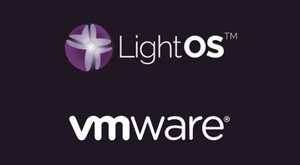
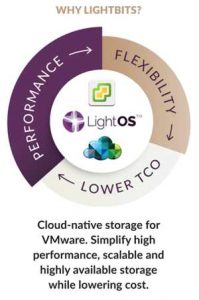
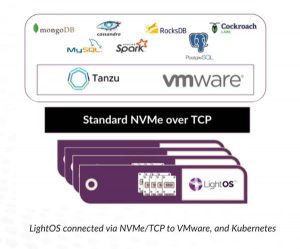
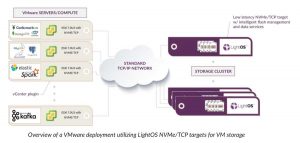
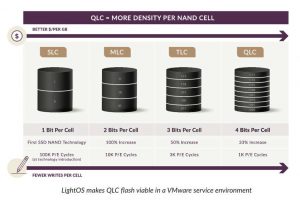






 Subscribe to our free daily newsletter
Subscribe to our free daily newsletter

